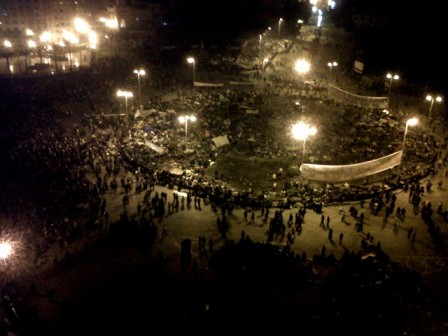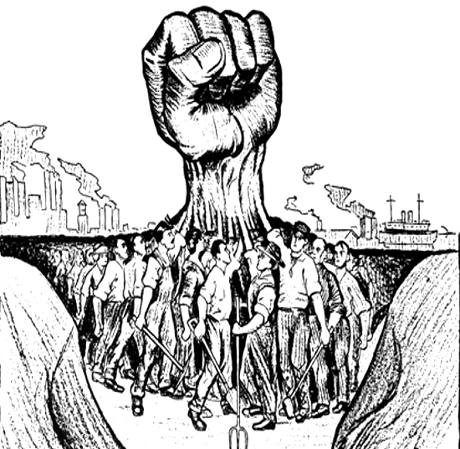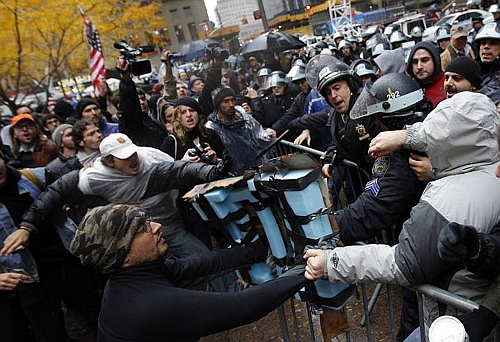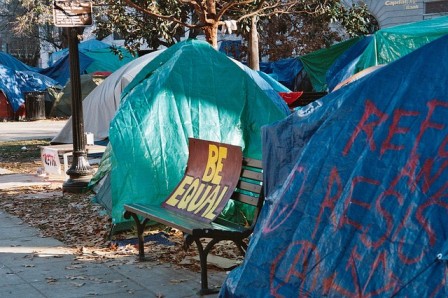Has Occupy Forgotten Why?

NEWS JUNKIE POST
Jan 29, 2012 at 5:54 pmBy Gilbert Mercier and Liam Fox
Even though the revolution in Egypt is still at an uncertain, fluid stage, they’ve already made an irreversible geopolitical impact in the Middle-East, and beyond. If 9/11/2001 marked the start of a dark chapter in world history, 2/11/2011 may have been the beginning of a new era of positive global systemic changes challenging a worldwide unsustainable course of development.
Its progeny, the Occupy movement in America, is only four months old. Taking root in the labor uprising in Madison, Wisconsin, the movement has spread across the country. Occupy camps have sprung up one after the other, and, one after the other, have been struck down by the authorities. The 99 percent are struggling to gain a foothold, but, so far, they’ve achieved little more than providing new slogans to be exploited by political campaigns and establishment activists.
 Ben Ali in Tunisia, and Mubarak in Egypt, were pawns in the global game of transnational predatory capitalism. The fact that they were both toppled means that this imperialist world order can be challenged. Despite their different specifics, both revolutions were fueled by what are the universal desires of every human beings: social justice, economic justice, freedom of speech, and the right to define our destiny through a fair democratic process.
Ben Ali in Tunisia, and Mubarak in Egypt, were pawns in the global game of transnational predatory capitalism. The fact that they were both toppled means that this imperialist world order can be challenged. Despite their different specifics, both revolutions were fueled by what are the universal desires of every human beings: social justice, economic justice, freedom of speech, and the right to define our destiny through a fair democratic process.
In America, there is a danger that this has been forgotten. Compromise and co-option by establishment ‘activists’, and political operatives, have clouded the fundamental issues that drove people to leave the lives they knew and Occupy the nations public spaces. The untamed fire that brought them to the squares has been domesticated and articulated in a voice not their own. Their simple call for equality, and emancipation from the rule of the 1 percent – the global financial elite – has been turned into a convoluted diatribe encompassing the goals of every special interest wishing to ride the coattails of their momentum.
Abuse of power is not unique to countries dominated by charismatic figures, ‘strong-men’ dictators, or military regimes. Even Western Democracies suffer from the same social and economic inequalities (America’s wealth inequality is far greater than Egypt’s), repression of dissent (the U.S. Patriot Act, Espionage Act, SOPA, PIPA, and ACTA), challenges to freedom of speech (the campaign against Julian Assange, WikiLeaks, and journalists covering Occupy), and the exploitation of the many for the profit of the few (austerity measures and loss of services to maintain the profits of global financiers).
The fundamental mechanisms that collect wealth in the hands of the few are universal to global capitalism. Regardless of the outward appearance of any existing political system, the impact on the citizens of the planet, their livelihood, and their environment, is the same.
 In North Africa and the Middle-East, the domino effect generated by the revolutions in Tunisia and Egypt is already on its way. Despite the new narrative coming from Washington, pushing its vassals states for superficial reforms to quell the uprising, it seems that the wave is too powerful to be stopped or even contained. Former Secretary of State Henri Kissinger once said that “power is the ultimate aphrodisiac.” This statement not only defines the psychology of men like Ben Ali, Mubarak, and Putin, it proves revealing of the global elite and their pursuit of empire.
In North Africa and the Middle-East, the domino effect generated by the revolutions in Tunisia and Egypt is already on its way. Despite the new narrative coming from Washington, pushing its vassals states for superficial reforms to quell the uprising, it seems that the wave is too powerful to be stopped or even contained. Former Secretary of State Henri Kissinger once said that “power is the ultimate aphrodisiac.” This statement not only defines the psychology of men like Ben Ali, Mubarak, and Putin, it proves revealing of the global elite and their pursuit of empire.
Kissinger, who had his hands in US foreign policy for 40 years, was a so called ‘pragmatist.’ In other words, he was in favor of supporting autocrats as long as the interests of the empire were not challenged. Even until recently, a common school of thought in Washington was that “Arabs were not ready for democracy.” Not only are they ready, but Tunisians and Egyptians are giving us all a lesson in courage and democracy in its ultimate form. The Arab world is defining its own history over issues that concern all of us, and the sheer emotion of it will ignore national borders.
The American Occupy movement is still struggling with unity between cities, and developing a clarity of the message it allowed to be diluted by others, to challenge the more important question of nationalism. A society that has been long divided by prejudice, racism, and fear of ‘the other’ is having difficulty coordinating a unified voice that overcomes these historic barriers and joins the global chorus.
 It is the Empire that has been established by global capitalism that is not ready for democracy in Egypt, Tunisia, Algeria, Syria, Yemen, Saudi Arabia, Bahrain or America. It’s the global capitalist empire that needs to maintain a strangle-hold on our global resources divided by region, just as it needs to maintain control of its industrial workforces and profitable consumer economies throughout the European Union and America. Elements of democracy have been rationed at the minimum necessary to gain the cooperation of those under the control of the system.
It is the Empire that has been established by global capitalism that is not ready for democracy in Egypt, Tunisia, Algeria, Syria, Yemen, Saudi Arabia, Bahrain or America. It’s the global capitalist empire that needs to maintain a strangle-hold on our global resources divided by region, just as it needs to maintain control of its industrial workforces and profitable consumer economies throughout the European Union and America. Elements of democracy have been rationed at the minimum necessary to gain the cooperation of those under the control of the system.
When the greed of the elite supersedes the tolerance of the people, and the crumbs are spread too thin, the people rise up. This seems to be happening, but to what end? What is the end game?
Superficial changes may be offered, such as what we saw when Ben Ali and Mubarak offered simple shuffling within their regimes, or the subsequent replacement of them as stewards of the status quo by their country’s generals. In more sophisticated situations, like the pseudo-democracies of Europe and America, the citizens of a ‘democratic republic’ may be allowed to argue amongst themselves, and even vote, on how they will meet the financial demands of the global elite, or establish a sense of equality, among themselves. Not a true equality mind you. The elite are not factored into the equation. Their status and profits remain fixed, as we have learned with the financial crash of 2007-2008. Who will be taxed more and who will work longer, and harder, is the most that citizens are allowed to fight over. And, if we’re loud enough, as the people in Egypt have learned, we may be offered a few more crumbs from the table.
Despite the enormous impact of what has been accomplished in Egypt, it is only the beginning. A few wise individuals chose to remain in Tahrir square until a true, democratic, civilian government is established. They faced pressure from the military, as well as from their fellow countrymen who were fooled by the removal of Mubarak. The uprising has proven that the empire can be challenged, but real change will require prolonged commitment and great sacrifice. Only the appearance of change has been offered in the Middle-East, Europe, and America. The strength of the movement must continue until the demands of the people are realized in full.
The motivation of this movement rises above petty nationalism. The roots of the unrest go deeper than the specifics of a city, a district, a state, a region, a language, a religion or a culture. The roots of this unrest can be found in the principles borne out of the age of enlightenment and continued in the current writings of Alain Badiou and Slavoj Zizek, among others. The roots of this revolution are universal in principle and global in their impact.
The struggle throughout the Arab world is part and parcel with the anti-austerity struggle in Greece, Spain, France, Ireland, and America. The global empire built on predatory capitalism has victimized the people of the world and relegated individuals to the status of serfs. Regional exploitation has resulted in third world countries, banana republics, industrialized nations, and consumer societies… all neatly compartmentalized to service a global economy that increasingly benefits the few, the elite, the modern global nobility.
What we can learn from Egypt is that a single punch will not win this fight. The empire has taken the this glancing blow and is shaking it off, smiling, firmly planted on its feet. Loosing Mubarak doesn’t even qualify as a black eye. Real change can only be accomplished with a full follow-through resulting in complete destabilization. A protracted general strike and reclaiming of natural resources may be the only thing that can truly bring about a just, sustainable, world order. And, a new world order will require a global effort.
A shared goal and alternative system must be established. The force of the Egyptian people stopped the old guard in its tracks, but there was nothing prepared to replace it. The Universal Declaration of Human Rights provides a framework of principles to organize a global movement around. These are neither regional concerns nor issues that can be dealt with by regional remedies. The principles enshrined in the declaration must be applied to all humans regardless of geography or current status in the global hierarchical empire. A new system of government must be explored and an alternative, sustainable, non-exploitive, economic system must be implemented to realize these principles and ideals. In order to ensure our own rights and freedoms, we must stand for the rights and freedoms of all.
Egypt’s struggle has just begun. It is more than symbolic. It has demonstrated the real potential for change. It is the same struggle as in Greece, Ireland, Yemen, China, America, and Saudi Arabia, and suffers from the same barriers… the greatest barrier being self imposed through the lack of unity, combination, and cooperation. It is the struggle of the many against the few. It is the struggle of the expendable class against the global elite. It is the struggle of those who strive for true universal equality and emancipation.
Will we finally reach across borders to lift each other up rather than exploit? Will we finally achieve shared prosperity rather than fight for table-scraps while the elite hoard our resources and profit from our labor? Will we join in a global struggle for universal equality? Will we build a global movement that can provide the follow-through to Egypt’s glorious first punch? Will the many finally triumph over the few?
When Occupations face the fury of State; when tear-gas and tasers are the answer to your petitions; when your choices are to fold or to fight, what will be the reason that you remember for coming in the first place? Will you think of reforms to the existing establishment, like the ones offered the Egyptians? Will you think of a new candidate to perform their role in a system that has been sold to the highest bidder? Will you wish for ways to make your enslavement to this system more palatable at the continued cost to your brothers and sisters around the world? Or, will you remember emancipation?
Emancipation. Emancipation from an unjust, unequal, and unsustainable system. Emancipation and equality, unconditionally, for you, and for all. Is this the goal you’ll remember? Will you seek to end the 1% or beg them for a few more crumbs by throwing temper tantrums in parks.
Don’t be distracted by the myriad of issues that have been placed, like land-mines, in your way. You are not there to solve all of societies ills. You are there to reclaim your planet, and a truly democratic system, so that we can all, together, work at solving societies ills without the interference of a self-serving financial elite controlling our politics and keeping us divided.
Remember why you’re there. Remember the 99 percent. Focus on the 1 percent. Remember emancipation. Take no substitute. Settle for nothing less.
Related Articles
- February 13, 2011 Global Revolution: Will the Many Finally Triumph Over the Few?
- December 3, 2011 My Thoughts on Occupy
- February 8, 2012 Will Occupy Choose Super-PAC Funding Over Radical Action?
- January 28, 2012 The Occupy Movement And Those That Would Love It To Death
- November 14, 2012 Can Europe Spark a Global Revolution Against Shock Capitalism?
- December 17, 2011 Growing Pains: When Hate and Exclusion Occupy

















You must be logged in to post a comment Login